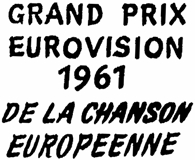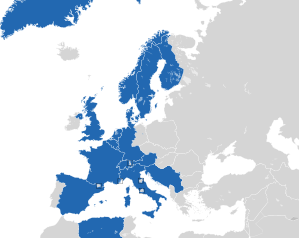The Eurovision Song Contest 1961 was the 6th edition of the annual Eurovision Song Contest. Once again, the contest was held in the French seaside city of Cannes, having also hosted the 1959 edition. Organised by the European Broadcasting Union (EBU) and host broadcaster Radiodiffusion-Télévision Française (RTF), the contest was again held at the Palais des Festivals et des Congrès on Saturday 18 March 1961, becoming the first contest to take place on a Saturday evening, a tradition that has continued ever since (with the exception of 1962). The show was directed by Marcel Cravenne and again hosted by Jacqueline Joubert, who had also hosted in 1959.[1]
| Eurovision Song Contest 1961 | |
|---|---|
 | |
| Dates | |
| Final | 18 March 1961 |
| Host | |
| Venue | Palais des Festivals et des Congrès Cannes, France |
| Presenter(s) | Jacqueline Joubert |
| Musical director | Franck Pourcel |
| Directed by | Maurice Barry |
| Executive producer | Marcel Cravenne |
| Host broadcaster | Radiodiffusion-Télévision Française (RTF) |
| Website | eurovision |
| Participants | |
| Number of entries | 16 |
| Debuting countries | |
| Non-returning countries | None |
| |
| Vote | |
| Voting system | Ten-member juries distributed 10 points among their favourite songs. |
| Winning song | "Nous les amoureux" |
Sixteen countries participated in the contest - three more than in the previous edition; Finland, Spain and Yugoslavia all competed for the first time this year.
The winner was Luxembourg with the song "Nous les amoureux", performed by Jean-Claude Pascal, written by Maurice Vidalin, and composed by Jacques Datin, with the United Kingdom finishing in second place for the third consecutive year.
Location

The event took place in Cannes, France, following the nation's victory at the 1960 edition with the song "Tom Pillibi", performed by Jacqueline Boyer. The selected venue was the Palais des Festivals et des Congrès, built in 1949 to host the Cannes Film Festival and located on the Promenade de la Croisette along the shore of the Mediterranean Sea.[2][3] Due to the growth in the film festival a new building bearing the same name was opened in 1982, with the original building renamed as the Palais Croisette and subsequently demolished in 1988.[4] It also hosted the 1959 edition of the Eurovision Song Contest.[2]
Participating countries
| Eurovision Song Contest 1961 – Participation summaries by country | |
|---|---|
Interest in the competition began to grow across Europe as three new countries participated for the first time: Finland, Spain, and Yugoslavia.[5]
Both Belgium's Bob Benny and Norway's Nora Brockstedt made their second appearances at the contest; Benny had previously represented Belgium in the 1959 contest with the song "Hou toch van mij", while Brockstedt represented Norway for the second consecutive year, having performed "Voi Voi" the previous year.[2]
Production
Marcel Cravenne directed the show, the director of photography was Maurice Barry.[10] Roger Valat served as technical director.[11] Six TV cameras were used, including one showing the Mediterranean sea and the outside of the venue during the first seconds of the show.[10]
Like in 1959, the stage was designed by Gérard Dubois.[1][12] It was notably larger than in previous years and featured a central staircase decorated with flowers, leading up to a terrace flanked by trees, so that the entire stage gave the impression of a Mediterranean garden.[10] Dubois first made a scale model of the stage in Paris, then went to Cannes and chose the trees together with André Racot, head of the Cannes municipal gardens,[13] paying attention that the trees were not too dark-colored for the TV cameras.[10] The flower pots were then added on the day of the show so that they were fresh and unaltered by unsuitable temperature and light conditions.[10]
Format
Initial plans foresaw that the greenroom was part of the stage so that artists stayed on the stage after having performed.[10] However, this idea finally was not realised in the live show.[14]
The draw to determine the running order took place on 16 March 1961 at the Carlton Hotel in Cannes.[11] It was presented by Jacqueline Joubert, assisted by two children aged six and four.[11]
Rehearsals started on 16 March 1961.[11]
Contest overview
The contest was held on 18 March 1961, beginning at 22:00 (CET) and lasted 1 hour and 30 minutes.[2][15] The event was hosted by French television presenter Jacqueline Joubert, who had previously presented the previous contest held in France in 1959.[2][5]
The interval act was a ballet performance under the title "Rendez-vous à Cannes" with music written by Raymond Lefèvre and performed by Tessa Beaumont and Max Bozzoni.[10][16]
The winner was Luxembourg represented by the song "Nous les amoureux", composed by Jacques Datin, written by Maurice Vidalin and performed by Jean-Claude Pascal.[17] This was the first of an eventual five contest victories that Luxembourg would go on to achieve.[18]
After the show, a supper for the participating delegations was held at the Salon des Ambassadeurs of the Casino municipal.[19]
| R/O | Country | Artist | Song | Points | Place |
|---|---|---|---|---|---|
| 1 |  Spain Spain | Conchita Bautista | "Estando contigo" | 8 | 9 |
| 2 |  Monaco Monaco | Colette Deréal | "Allons, allons les enfants" | 6 | 10 |
| 3 |  Austria Austria | Jimmy Makulis | "Sehnsucht" | 1 | 15 |
| 4 |  Finland Finland | Laila Kinnunen | "Valoa ikkunassa" | 6 | 10 |
| 5 |  Yugoslavia Yugoslavia | Ljiljana Petrović | "Neke davne zvezde" | 9 | 8 |
| 6 |  Netherlands Netherlands | Greetje Kauffeld | "Wat een dag" | 6 | 10 |
| 7 |  Sweden Sweden | Lill-Babs | "April, april" | 2 | 14 |
| 8 |  Germany Germany | Lale Andersen | "Einmal sehen wir uns wieder" | 3 | 13 |
| 9 |  France France | Jean-Paul Mauric | "Printemps (avril carillonne)" | 13 | 4 |
| 10 |  Switzerland Switzerland | Franca di Rienzo | "Nous aurons demain" | 16 | 3 |
| 11 |  Belgium Belgium | Bob Benny | "September, gouden roos" | 1 | 15 |
| 12 |  Norway Norway | Nora Brockstedt | "Sommer i Palma" | 10 | 7 |
| 13 |  Denmark Denmark | Dario Campeotto | "Angelique" | 12 | 5 |
| 14 |  Luxembourg Luxembourg | Jean-Claude Pascal | "Nous les amoureux" | 31 | 1 |
| 15 |  United Kingdom United Kingdom | The Allisons | "Are You Sure?" | 24 | 2 |
| 16 |  Italy Italy | Betty Curtis | "Al di là" | 12 | 5 |
Spokespersons
Each country nominated a spokesperson who was responsible for announcing the votes for their respective country via telephone. Known spokespersons at the 1961 contest are listed below.
 Netherlands – Siebe van der Zee[21]
Netherlands – Siebe van der Zee[21] Sweden – Roland Eiworth[22]
Sweden – Roland Eiworth[22] United Kingdom – Michael Aspel[2]
United Kingdom – Michael Aspel[2]
Detailed voting results
Each country had 10 jury members who each awarded 1 point to their favourite song. The jury members were television viewers representing the public.[1]
It is noticeable that during the voting, Luxembourg gave the UK eight points, and Norway also gave Denmark eight points. It was the largest number of points given to a country by a single jury since 1958, when Denmark provided France with nine points. Such a high number of points obtained by a country would not be achieved until 1970, when Ireland would receive nine points from Belgium.[5]
Total score | Italy | United Kingdom | Luxembourg | Denmark | Norway | Belgium | Switzerland | France | Germany | Sweden | Netherlands | Yugoslavia | Finland | Austria | Monaco | Spain | ||
|---|---|---|---|---|---|---|---|---|---|---|---|---|---|---|---|---|---|---|
Contestants | Spain | 8 | 1 | 2 | 2 | 1 | 1 | 1 | ||||||||||
| Monaco | 6 | 1 | 1 | 3 | 1 | |||||||||||||
| Austria | 1 | 1 | ||||||||||||||||
| Finland | 6 | 2 | 2 | 1 | 1 | |||||||||||||
| Yugoslavia | 9 | 1 | 1 | 1 | 2 | 1 | 3 | |||||||||||
| Netherlands | 6 | 2 | 1 | 1 | 2 | |||||||||||||
| Sweden | 2 | 2 | ||||||||||||||||
| Germany | 3 | 1 | 1 | 1 | ||||||||||||||
| France | 13 | 2 | 1 | 4 | 1 | 1 | 2 | 2 | ||||||||||
| Switzerland | 16 | 2 | 2 | 4 | 2 | 1 | 2 | 2 | 1 | |||||||||
| Belgium | 1 | 1 | ||||||||||||||||
| Norway | 10 | 1 | 5 | 1 | 2 | 1 | ||||||||||||
| Denmark | 12 | 8 | 2 | 1 | 1 | |||||||||||||
| Luxembourg | 31 | 3 | 1 | 1 | 1 | 5 | 1 | 1 | 5 | 3 | 4 | 4 | 2 | |||||
| United Kingdom | 24 | 1 | 8 | 1 | 1 | 7 | 3 | 3 | ||||||||||
| Italy | 12 | 4 | 4 | 1 | 1 | 1 | 1 | |||||||||||
Broadcasts
Each participating broadcaster was required to relay the contest via its networks. Non-participating EBU member broadcasters were also able to relay the contest as "passive participants". Broadcasters were able to send commentators to provide coverage of the contest in their own native language and to relay information about the artists and songs to their television viewers.[25] The local press reported a total number of 14 commentators for the contest, and a total of 16 countries broadcasting the event.[10][19]
No official accounts of the viewing figures are known to exist. An estimate given in the French press ahead of the contest was 40 million viewers all over Europe.[10]
Known details on the broadcasts in each country, including the specific broadcasting stations and commentators are shown in the tables below.
Notes
References
External links


